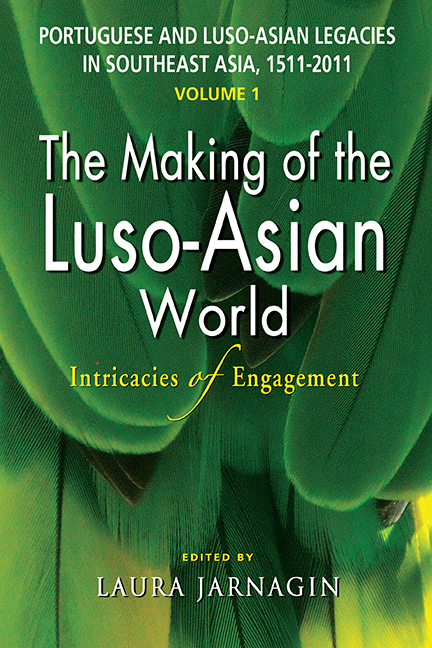 Portuguese and Luso-Asian Legacies in Southeast Asia, 1511–2011, vol. 1
Portuguese and Luso-Asian Legacies in Southeast Asia, 1511–2011, vol. 1 Book contents
- Frontmatter
- Contents
- List of Charts, Figures and Tables
- A Tribute to Glenn Ames
- Preface
- List of Contributors
- Glossary
- Introduction: Towards Clarity through Complexity
- Part One Adaptations and Transitions in the South and Southeast Asian Theatres, Sixteenth through Eighteenth Centuries
- Part Two Dispersion, Mobility and Demography from the Sixteenth into the Twenty-first Centuries
- Part Three Mixed Legacies: The Portuguese and Luso-Asians in the Twentieth and Twenty-first Centuries
- 9 Portuguese Communities in East and Southeast Asia during the Japanese Occupation
- 10 Indo-Portuguese Literature and the Goa of Its Writers
- 11 Binding Ties of Miscegenation and Identity: The Narratives of Henrique Senna Fernandes (Macao) and Rex Shelley (Singapore)
- 12 Portuguese Past, Still Imperfect: Revisiting Asia in Luso-Diasporic Writing
- Bibliography
- Index
12 - Portuguese Past, Still Imperfect: Revisiting Asia in Luso-Diasporic Writing
from Part Three - Mixed Legacies: The Portuguese and Luso-Asians in the Twentieth and Twenty-first Centuries
Published online by Cambridge University Press: 21 October 2015
- Frontmatter
- Contents
- List of Charts, Figures and Tables
- A Tribute to Glenn Ames
- Preface
- List of Contributors
- Glossary
- Introduction: Towards Clarity through Complexity
- Part One Adaptations and Transitions in the South and Southeast Asian Theatres, Sixteenth through Eighteenth Centuries
- Part Two Dispersion, Mobility and Demography from the Sixteenth into the Twenty-first Centuries
- Part Three Mixed Legacies: The Portuguese and Luso-Asians in the Twentieth and Twenty-first Centuries
- 9 Portuguese Communities in East and Southeast Asia during the Japanese Occupation
- 10 Indo-Portuguese Literature and the Goa of Its Writers
- 11 Binding Ties of Miscegenation and Identity: The Narratives of Henrique Senna Fernandes (Macao) and Rex Shelley (Singapore)
- 12 Portuguese Past, Still Imperfect: Revisiting Asia in Luso-Diasporic Writing
- Bibliography
- Index
Summary
The expression “Lusophony” has been gaining increasing currency as a device that helps to regain — in both the “spiritual realm” of the cultural products — (language, with “Lusophony”) and the institutional one, with the CPLP [Community of Portuguese-Speaking Countries] — that which has been lost in the political and material one (Empire as such).
Miguel Vale de Almeida, An Earth-Colored Sea (2004)In light of the above epigraph, it is perhaps needless to say that it is with a considerable measure of caution, if not outright ambivalence, that I consider the possibility of a return to Asia for Lusophone literary and cultural studies today. For this reason, perhaps it should first be made clear what is meant by the idea of “commemorating legacies” that is presumably the pretext for our assembly here on the Straits of Malacca for the purposes of this conference. From my point of view, I understand it as an invitation to expand participation in, and thus add what each of us can, to the reworking of a shared (if not always directly inherited) set of memories, however obscured, intermittent and thus continually incomplete they may be: in this case, of a 500-year-long Portuguese presence and subsequent cultural contact in South, Southeast and East Asia. Whatever dates each of us opts to privilege from this long historical narrative in 2011, aside from the presumably foundational date of 1511 — some of us might also wish to highlight under this rubric the fifty years that separate us from the end of Portuguese rule in Goa, or the ten or so that separate us from the vote and eventual independence of East Timor, as well as the return of Macao to China — what remains undeniable is that the dates that mark out our ever-selective memory are politically charged involuntarily. It is with this in mind, that, as in the writings of the Portuguese philosopher Eduardo Lourenço, I too refer to the Portuguese past as “imperfect”: that is, a past still recognizably present, one still unfinished and still a “work-in-progress”, even if its “darker chapters” simultaneously call into question the very notion of progress.
- Type
- Chapter
- Information
- Portuguese and Luso-Asian Legacies in Southeast Asia, 1511–2011, vol. 1The Making of the Luso-Asian World: Intricacies of Engagement, pp. 259 - 272Publisher: ISEAS–Yusof Ishak InstitutePrint publication year: 2011
